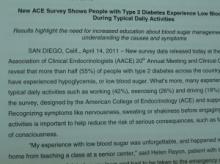From the annual meeting of the American Association of Clinical Endocrinologists (AACE), San Diego,CA:
More than half of adults in the U.S. with type 2 diabetes have had a low blood sugar episode, based on data from a survey of 2,530 adults diagnosed with type 2 diabetes. The online survey was developed by the American College of Endocrinology (ACE), the educational and scientific arm of the AACE, and supported by Merck. The survey was conducted in November and December 2010.
Notably, 42% experienced hypoglycemia while working, 26% reported it while exercising, and 19% reported it while driving.
“We know that hypoglycemia is very common,” Dr. Etie Moghissi, vice president of AACE. “The surprising part was that these had occurred during daily activities.” Dr. Moghissi presented the survey findings during a press briefing at the meeting.
Although a majority of the respondents knew that dizziness and shakiness were signs of hypoglycemia, 22% and 17% of respondents, respectively, were unaware that these symptoms could be hypoglycemia signs. In addition, 46%, 35%, and 27%, respectively, could not identify excessive exercise, certain diabetes medications, and skipping meals (particularly breakfast) as hypoglycemia triggers.
Furthermore, 6% of diabetes patients who reported hypoglycemia ended up in the emergency department as a result, and 21% said they needed help from someone to manage the episode.
“Hypoglycemia is underappreciated by both patients and health care providers,” Dr. Moghissi said. To help patients (and health care providers) learn more about what causes high or low blood sugar, ACE has developed a Web site, www.BloodSugarBasics.com. The site, supported by Merck, features fact pages, downloadable information, and interactive features, Dr. Moghissi noted.
–Heidi Splete (on Twitter @hsplete)

